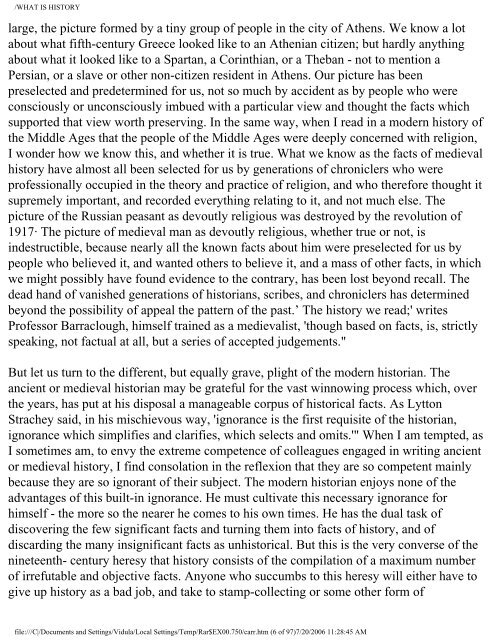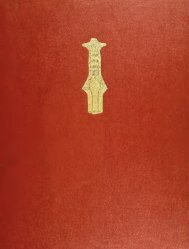What is History / by Edward Hallett Carr - Universal History Library
What is History / by Edward Hallett Carr - Universal History Library
What is History / by Edward Hallett Carr - Universal History Library
Create successful ePaper yourself
Turn your PDF publications into a flip-book with our unique Google optimized e-Paper software.
WHAT IS HISTORY<br />
large, the picture formed <strong>by</strong> a tiny group of people in the city of Athens. We know a lot<br />
about what fifth-century Greece looked like to an Athenian citizen; but hardly anything<br />
about what it looked like to a Spartan, a Corinthian, or a Theban - not to mention a<br />
Persian, or a slave or other non-citizen resident in Athens. Our picture has been<br />
preselected and predetermined for us, not so much <strong>by</strong> accident as <strong>by</strong> people who were<br />
consciously or unconsciously imbued with a particular view and thought the facts which<br />
supported that view worth preserving. In the same way, when I read in a modern h<strong>is</strong>tory of<br />
the Middle Ages that the people of the Middle Ages were deeply concerned with religion,<br />
I wonder how we know th<strong>is</strong>, and whether it <strong>is</strong> true. <strong>What</strong> we know as the facts of medieval<br />
h<strong>is</strong>tory have almost all been selected for us <strong>by</strong> generations of chroniclers who were<br />
professionally occupied in the theory and practice of religion, and who therefore thought it<br />
supremely important, and recorded everything relating to it, and not much else. The<br />
picture of the Russian peasant as devoutly religious was destroyed <strong>by</strong> the revolution of<br />
1917· The picture of medieval man as devoutly religious, whether true or not, <strong>is</strong><br />
indestructible, because nearly all the known facts about him were preselected for us <strong>by</strong><br />
people who believed it, and wanted others to believe it, and a mass of other facts, in which<br />
we might possibly have found evidence to the contrary, has been lost beyond recall. The<br />
dead hand of van<strong>is</strong>hed generations of h<strong>is</strong>torians, scribes, and chroniclers has determined<br />
beyond the possibility of appeal the pattern of the past.’ The h<strong>is</strong>tory we read;' writes<br />
Professor Barraclough, himself trained as a medieval<strong>is</strong>t, 'though based on facts, <strong>is</strong>, strictly<br />
speaking, not factual at all, but a series of accepted judgements."<br />
But let us turn to the different, but equally grave, plight of the modern h<strong>is</strong>torian. The<br />
ancient or medieval h<strong>is</strong>torian may be grateful for the vast winnowing process which, over<br />
the years, has put at h<strong>is</strong> d<strong>is</strong>posal a manageable corpus of h<strong>is</strong>torical facts. As Lytton<br />
Strachey said, in h<strong>is</strong> m<strong>is</strong>chievous way, 'ignorance <strong>is</strong> the first requ<strong>is</strong>ite of the h<strong>is</strong>torian,<br />
ignorance which simplifies and clarifies, which selects and omits.'" When I am tempted, as<br />
I sometimes am, to envy the extreme competence of colleagues engaged in writing ancient<br />
or medieval h<strong>is</strong>tory, I find consolation in the reflexion that they are so competent mainly<br />
because they are so ignorant of their subject. The modern h<strong>is</strong>torian enjoys none of the<br />
advantages of th<strong>is</strong> built-in ignorance. He must cultivate th<strong>is</strong> necessary ignorance for<br />
himself - the more so the nearer he comes to h<strong>is</strong> own times. He has the dual task of<br />
d<strong>is</strong>covering the few significant facts and turning them into facts of h<strong>is</strong>tory, and of<br />
d<strong>is</strong>carding the many insignificant facts as unh<strong>is</strong>torical. But th<strong>is</strong> <strong>is</strong> the very converse of the<br />
nineteenth- century heresy that h<strong>is</strong>tory cons<strong>is</strong>ts of the compilation of a maximum number<br />
of irrefutable and objective facts. Anyone who succumbs to th<strong>is</strong> heresy will either have to<br />
give up h<strong>is</strong>tory as a bad job, and take to stamp-collecting or some other form of<br />
file:///C|/Documents and Settings/Vidula/Local Settings/Temp/Rar$EX00.750/carr.htm (6 of 97)7/20/2006 11:28:45 AM







